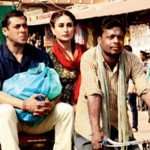





<Review by: Swati Sharan>
Directed by Kabir Khan. Starring Salman Khan, Kareena Kapoor, Nawazuddin Siddiqui, Harshali Malhotra
The story begins with a mute Pakistani child named Shahida (Harshali Malhotra) travelling to an Indian Muslim pilgrimage site with her mother and grandmother. Her mother’s hope is that a miracle will happen and Shahida will begin to speak. On their way back to Pakistan, Shahida sneaks out of the train to play with a goat while her mother is sleeping. Unfortunately, Shahida is unable to get back on the train as it is leaving and she is left behind in India. Her mother pleads with border services to go claim her back because she suspects Shahida is only a few kilometers away. But due to severe restrictions, she’s not allowed to.
In the meantime, Shahida wanders around when she bumps into a good samaritan with strong Hindu tones of rigidity named Pawan aka Bajrangi (Salman Khan). Because she can’t speak, Pawan is unable to identify where she is from or what religion she is. But when he does, he is determined to take her back home. The film therein traces the tribulations of a person with low income, honesty beyond belief and no backing, with hilarious twists along the way.
For a topic that otherwise makes people feel dreary, the film serves as a refreshing change. What’s great about it is that everyone’s allowed to shine in their performances with Harshali being the heart stealer. Salman is hilarious while Siddiqui is true to life in his portrayal of Chand Nawab. (Though the film is fiction, Chand Nawab has been inspired by a real Pakistani journalist). In terms of people feeling this to be a make-believe film, I beg to differ. Yes, there are cinematic liberties taken when it comes to odd points but this is also not a traditional art film. The whole point was to make the movie appealing to the masses and to underscore how dumb the whole bureaucracy of border crossing is. It further shows us how in a country where there are so many with limited literacy or financial access, how difficult it is to expect them to follow such formal written protocol. Especially when someone may have stumbled into either border by accident. And given that it happens often enough, why isn’t there a more organised and humane way of dealing with this? Many poor people are forced to give up looking for loved ones because they run out of resources or avenues. There is a great need for a user-friendly reform.
I have personally come across a similar case of a lost, hearing-impaired girl named Gita who was from near the India (Punjab)-Pakistan border. She was lost without documents when she was 11 and was trying to go back to India in her twenties. She couldn’t give the name of her village district properly and didn’t have the official names of relatives. Pakistani social workers and journalists were trying to help her track her family down. I also tried to get the Indian media to forward an alert for her parents. Like the movie, there were many guessing games people tried to play to put things together. Unfortunately, three years later, Gita is still in a Pakistani shelter. So heroes exist on either side of the border. But we need to give them the chance to succeed.
And that will start when we push for border reforms, better relations and stop regarding the other side as the enemy. I also felt the film’s portrayal of characters was down to earth and reflective of what people on either side really are: human. It wasn’t favouring or opposing any one group of people. Overall, it’s a tale well told.
.
- Salman Khan and Harshali Malhotra in Bajrangi Bhaijaan
- Bajrangi Bhaijaan movie poster
- Salman Khan in Bajrangi Bhaijaan
- Salman Khan and Kareena Kapoor in Bajrangi Bhaijaan







0
comments